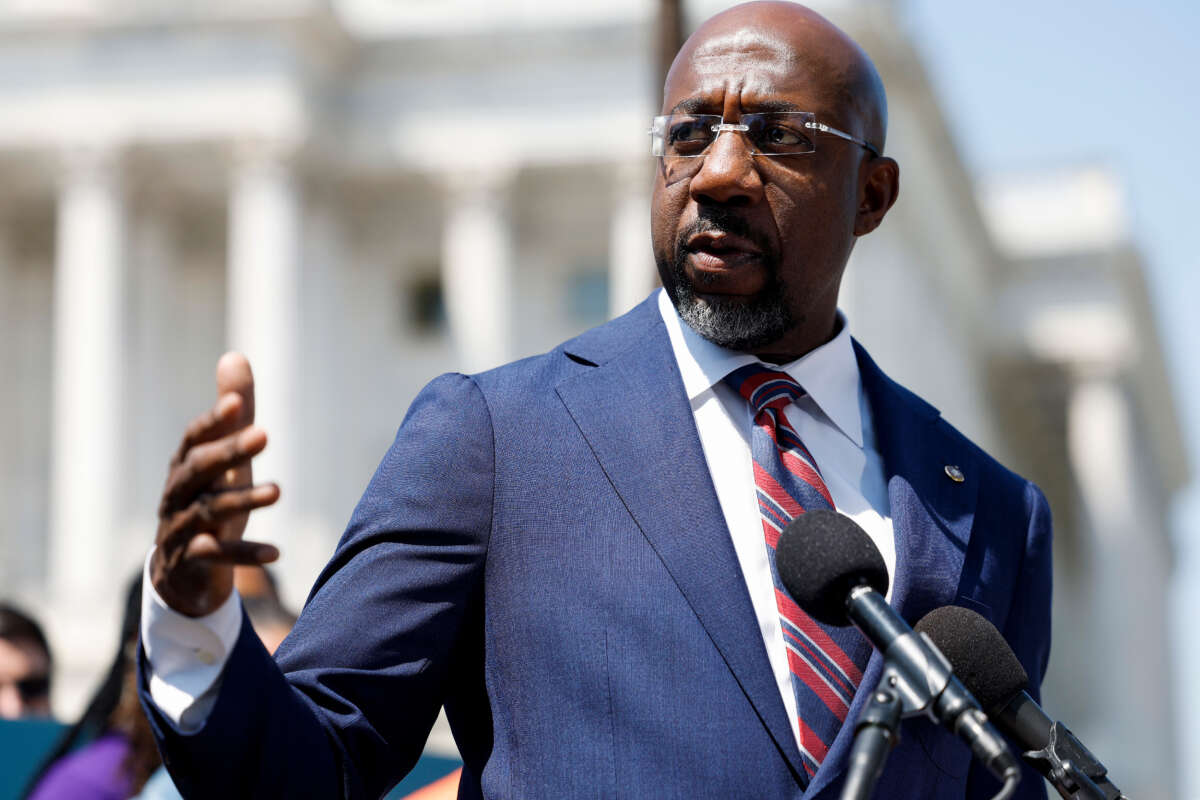After months of silence on the violent repression of activists organizing against a massive planned police militarization compound in Atlanta known as Cop City, Georgia Sen. Raphael Warnock (D) has spoken up about the issue, sending a letter this week to the Department of Homeland Security (DHS) expressing concern over the potentiality of activists’ First Amendment rights being trampled by the extremely dubious terrorism charges being hurled against them.
Warnock first spoke out about the issue on Sunday, before a scheduled Atlanta City Council vote where councilors would approve $67 million in total for the 85 acre compound and after the egregious arrests of three key organizers for the Atlanta Solidarity Fund, a bail fund that has been instrumental in helping activists in the movement.
Although Warnock raised concerns about law enforcement’s chilling of free speech in the state, he also chided activists and failed to mention Cop City by name in his 10-tweet-long thread about the arrests. The other senator from Georgia, Jon Ossoff (D), issued a similar statement, which activists said was “even weaker” than Warnock’s.
This was one of the first times, if not the first time, that Warnock and Ossoff have spoken publicly about the issue, despite the many extreme moves that the state has taken against activists so far, including shooting and killing one activist and charging 42 activists with terrorism — charges that activists have maintained are a tactic to repress the movement and suppress left-wing voices at large.
Then, on Wednesday, Warnock sent a letter to Homeland Security Secretary Alejandro Mayorkas asking DHS to clarify the terrorist designations at the federal, state and local levels, again raising concerns about protesters’ First Amendment rights being potentially infringed.
In that letter, he asked DHS to clarify whether or not it has designated Stop Cop City activists as “domestic violent extremists,” or DVEs, as the state and Atlanta police have claimed the department has, and to pass down that clarification to Georgia law enforcement.
Even while raising these concerns, however, Warnock bent over backwards to praise the law enforcement involved in the case.
“The First Amendment protects the freedom of speech and the freedom of peaceful association. Consistent with these principles, I am concerned by any misunderstandings regarding a federal DVE designation and seek clarification for the public and our valued law enforcement partners,” the letter says.
“Peaceful protest is a quintessentially American activity — and a fundamental Constitutional right,” Warnock continued. “As someone who has long engaged in justice work, I am personally aware of the importance of nonviolent protest movements through American history and their role in driving our country forward to a more perfect and more just union.”
Some online described the letter as “the bare minimum,” while others expressed frustration that it took Warnock and Ossoff so long to issue any public statements on the issue.
DHS has said that it “does not classify or designate any groups as domestic violent extremists” (DVEs). But it has issued bulletins strongly suggesting that it believes the activists are terrorists; the activists were included in a May DHS advisory of “terrorism-related threat to the United States” as “alleged DVEs.” And, indeed, despite DHS’s insistence, Georgia law enforcement have said that they believe, based on DHS’s words — and without any empirical evidence — that the label is accurate.
“Although DHS reports that they do not classify or designate any groups as domestic violent extremists, the description provided by DHS for a domestic violent extremist does in fact describe the behavior of the individuals of the group in question,” Georgia Bureau of Investigation Nelly Miles told The Atlanta Journal-Constitution this week.
In other words, DHS has helped to lay the groundwork for state and local agencies to pursue their case against the activists by using some of the most punitive designations possible, even as the department seeks to dodge culpability.
In fact, DHS’s far right lean in regards to activists has been clearly on display in response to Stop Cop City; as The Intercept uncovered this week, one December 2022 report from DHS’s Cybersecurity and Infrastructure Security Agency almost directly lifted wording from an article written by far right writer Andy Ngo verbatim in labeling activists as “militants” and “part of a violent far-left occupation.” (Police have been caught lying that Cop City activists have engaged in violence.)
Join us in defending the truth before it’s too late
The future of independent journalism is uncertain, and the consequences of losing it are too grave to ignore. To ensure Truthout remains safe, strong, and free, we need to raise $47,000 in the next 8 days. Every dollar raised goes directly toward the costs of producing news you can trust.
Please give what you can — because by supporting us with a tax-deductible donation, you’re not just preserving a source of news, you’re helping to safeguard what’s left of our democracy.
